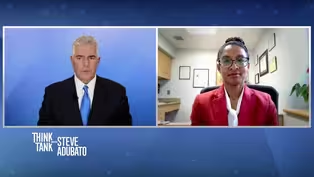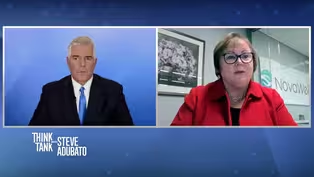
How growing cannabis could fuel the economy in New Jersey
Clip: 3/15/2025 | 9m 5sVideo has Closed Captions
How growing cannabis could fuel the economy in New Jersey
As part of our Special Series, " Urban Matters," Tai Cooper, Chief Community Development Officer, NJEDA, joins Steve Adubato to discuss the growing cannabis industry in New Jersey and how art installations and community projects help fuel the economy, particularly in urban areas.
Problems playing video? | Closed Captioning Feedback
Problems playing video? | Closed Captioning Feedback
Think Tank with Steve Adubato is a local public television program presented by NJ PBS

How growing cannabis could fuel the economy in New Jersey
Clip: 3/15/2025 | 9m 5sVideo has Closed Captions
As part of our Special Series, " Urban Matters," Tai Cooper, Chief Community Development Officer, NJEDA, joins Steve Adubato to discuss the growing cannabis industry in New Jersey and how art installations and community projects help fuel the economy, particularly in urban areas.
Problems playing video? | Closed Captioning Feedback
How to Watch Think Tank with Steve Adubato
Think Tank with Steve Adubato is available to stream on pbs.org and the free PBS App, available on iPhone, Apple TV, Android TV, Android smartphones, Amazon Fire TV, Amazon Fire Tablet, Roku, Samsung Smart TV, and Vizio.
Providing Support for PBS.org
Learn Moreabout PBS online sponsorship- We're now joined by our longtime friend of the show, Tai Cooper, Chief Community Development Officer for the New Jersey Economic Development Authority, otherwise known as the EDA.
The website will go up right now.
Tai, how you doing?
- So far, so good.
Been a busy and productive year.
- You got this at the end of 2024, be seen in '25.
I'm gonna read you a quote from you.
You ready?
- (chuckles) I'm ready.
- We're talking about the cannabis industry.
Right?
- Let's go.
- From Tai Cooper, for something that people have had a stigma against, there was a great opportunity to discuss the medicinal use, but also the small business and community benefits of cannabis.
What the heck is going on with cannabis in New Jersey, A, and B, what does the Economic Development Authority have to do with it, please, Tai?
- So I would say a lot.
I mean, under Governor Murphy's leadership and also the legislature, New Jersey has really been at the forefront of the cannabis market.
For New Jersey in particular, specifically focusing on EDA, we launched some of the largest grants in the nation.
One of the things we immediately recognized is that there's huge barriers to entry when it comes to financing or funding.
And so the governor and the legislature authorized us to have up to $20 million to support cannabis businesses.
Now, I had to explain this to my mom as well 'cause she was like, "What are you doing?"
- Hold on, what is, what is your, hold on.
Your mom's work is in the field of what?
- My mom was a teacher, but she's a minister.
She's a minister.
- Oh, she's a minister.
And Tai, how did it go when you told her what you were doing with the cannabis industry?
- The same look you just gave me is the look my mom gave me.
But I have made her a fast believer in the benefits socially, also medicinally, of cannabis.
And specifically for EDA, we did an intentional focus on social equity candidates.
We had two products, one called Joint Ventures.
Do not laugh at the names.
And the other one called Seed Equity.
The Joint Ventures program provided grants up to $250,000 to cannabis businesses.
And this had to be for businesses that were established, had their locations, and were ready to go.
The governor was fantastic in supporting us also with CRC, and we were able to award 48 grants, 48 grants to different business owners, which is a huge deal.
- Hold on, Tai, back for a second, acronyms in government, CRC.
- The Cannabis Regul- - Cannabis Regulatory Commission?
- Yes, it is.
- Okay.
Go ahead.
- So they're the regulatory bodies.
They're the ones that dictate how things run, how they go forward, but they're also a really great partner to have as far as checks and balances.
And so working closely with the governor's office, with CRC, we launched these two grants.
One grant, as I said, Joint Ventures, was for $250,000.
The second grant was for $150,000.
And the one for $150,000 was specifically for those, for social equity candidates.
And those are for people that have been impacted by the war on drugs.
And so we wanted to level out the playing field by providing grants, not loans.
These are grants that go directly towards the small business user.
And I would say by the end of this year, we're gonna have 26 out of the 48 Joint Ventures businesses that are open and operating, and nine out of the social equity businesses that will be open, operating, and running.
That is huge.
- So Tai, I wanna follow up on that.
You keep referring to social equity, right?
Why is it disproportionately more difficult for cannabis business professionals, entrepreneurs who happen to be Black and brown, to break into this business and to make money?
- Well, I mean, as we stated earlier from my quote, there is a stigma that is attached to cannabis.
There's a stigma that's attached to BIPOC communities with cannabis being because there was a war on drugs targeting BIPOC communities, that stigma hasn't left.
And so what we're trying to do is really shift that narrative and put it on its head to show that if you invest in communities and communities of color through cannabis, you can have dramatic effects.
And again, one of the key things we noticed, that this is a time-intensive and money-intensive and laborious process to get involved in.
And so unless you've got $2, $3, $4 million just hanging around, it's really hard to break into this industry.
And so working with the governor's office, working with EDA and all of my colleagues, we created grant programs to again level that playing field.
And the reason we made one of the grants, Seed Equity, specifically for social equity candidates is because we recognize the disadvantages that come with having a criminal record.
You know, despite the attempts to get over it, there still is a stigma, and so what we're trying to do again is make sure that we provide resources in advance for businesses that are qualified, that have already gotten their approvals from CRC.
So it's not anybody.
You have to still go through a very rigorous process.
But we are there to hold your hand.
We're there to provide funding, and also there to uplift those communities.
- Got it.
Again, put the website up for EDA.
- Thanks.
- Economic Development Authority.
What, the A.R.T., A-R-T program, activation, revitalization, trans, transformation, I'll get that out, grant program.
$37 million pie For what and for whom?
- So huge initiative, and again, this is something that we thank the governor's office for and also the legislature.
One of the things that EDA has really recognized is that art is an economic driver.
Whether you look at the work that's happening at NJPAC, the work happening at Symphony Hall, you're watching how the arts and culture ecosystem is really lifting up communities.
And so what we were able to do is award grants.
We started with a small pilot program in both Newark and Atlantic City, and we're super awesome and super excited to be able to award these grants.
And it goes towards public transformation of spaces and real estate.
So if you think about blighted buildings, you can do a rehab on those buildings or murals.
These are things, again, which are small interventions, but have a huge impact on communities.
And so we were incredibly excited to do round one, again focusing on Newark and Atlantic City.
And we just rolled out, or just closed out A.R.T.
Phase II, which was only for public space entities, but was open to 35 different cities.
And again, this is recognizing the fact that nonprofits and art entities also have a space in economic development.
They are viable, they're resourceful.
And again, the beautification of our communities means that you're gonna drive folks to come back to our downtowns, back to our cities, and have something to also do.
So very supportive of the work the governor has supported through the arts as well.
- Tai, got about a minute left.
Play, excuse me, place-based, but also people-centered- - Yes.
- community development.
Real quick, what does that mean?
- (chuckles) It means that the governor, when he first got into office, had historic investments into people and into communities.
And again, when we think about community development, it is focused on people.
It's a very people-centered approach, and very place-based, meaning that you don't do development without having the people in mind.
It means that when we're working with our government-restricted municipalities, such as Atlantic City, Trenton, and Paterson, we're walking with them hand in hand, not just providing resources, but also providing financial stability behind them.
It means programs like our Asset Activation Program, which gives $50,000 in grants to help with pre-development issues like, so feasibility studies, market analysis.
So you're providing resources to communities that typically wouldn't have those grants available immediately at their disposal.
So again, when we talk about place-based and people-centered, we're putting people at the center of everything that we're doing when it comes to development.
- Tai Cooper, community, excuse me, Chief Community Development Officer for the Economic Development Authority, the New Jersey Economic Development Authority.
Their website has been up.
Find out more.
Tai, thank you, my friend, we'll have you back soon.
- Thank you so much.
Absolutely.
- You got it.
That's Tai Cooper, I'm Steve Adubato.
We'll see you next time.
- [Narrator] Think Tank with Steve Adubato is a production of the Caucus Educational Corporation.
Funding has been provided by Robert Wood Johnson Foundation.
Valley Bank.
The Turrell Fund, a foundation serving children.
Kean University.
New Jersey Sharing Network.
PSEG Foundation.
The North Ward Center.
PSE&G.
Powering progress.
And by NJ Best, New Jersey’s five-two-nine college savings plan.
Promotional support provided by NJBIZ.
And by NJ.Com.
- If you register as an organ donor, you have the potential of saving up to eight lives.
- My neighbor passed away.
His eyes were actually donated and that person now can see.
- Not only can you save a life, but if something should happen to me and I'm no longer here, I know that in some small part I'll live on in someone else.
- Say yes, save lives.
- Say yes, save lives.
- Say yes, save lives.
- Be an organ and tissue donor.
How social determinants of health contribute to disparities
Video has Closed Captions
Clip: 3/15/2025 | 9m 29s | How social determinants of health contribute to disparities (9m 29s)
Integrating physical & behavioral health for better outcomes
Video has Closed Captions
Clip: 3/15/2025 | 8m 44s | Integrating physical & behavioral health for better outcomes (8m 44s)
Providing Support for PBS.org
Learn Moreabout PBS online sponsorship
- News and Public Affairs

Top journalists deliver compelling original analysis of the hour's headlines.

- News and Public Affairs

FRONTLINE is investigative journalism that questions, explains and changes our world.












Support for PBS provided by:
Think Tank with Steve Adubato is a local public television program presented by NJ PBS

